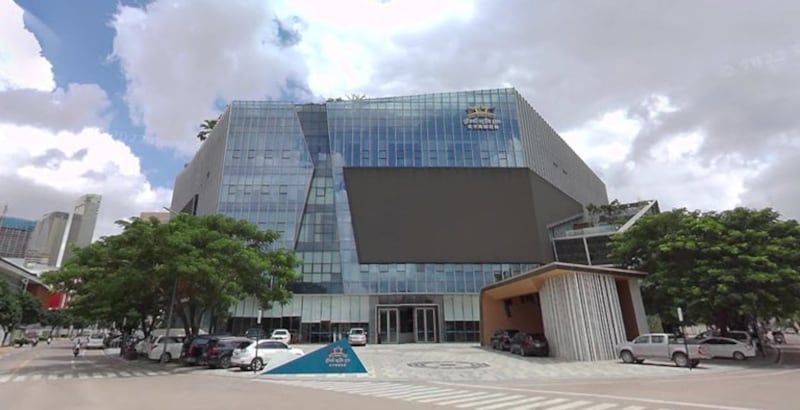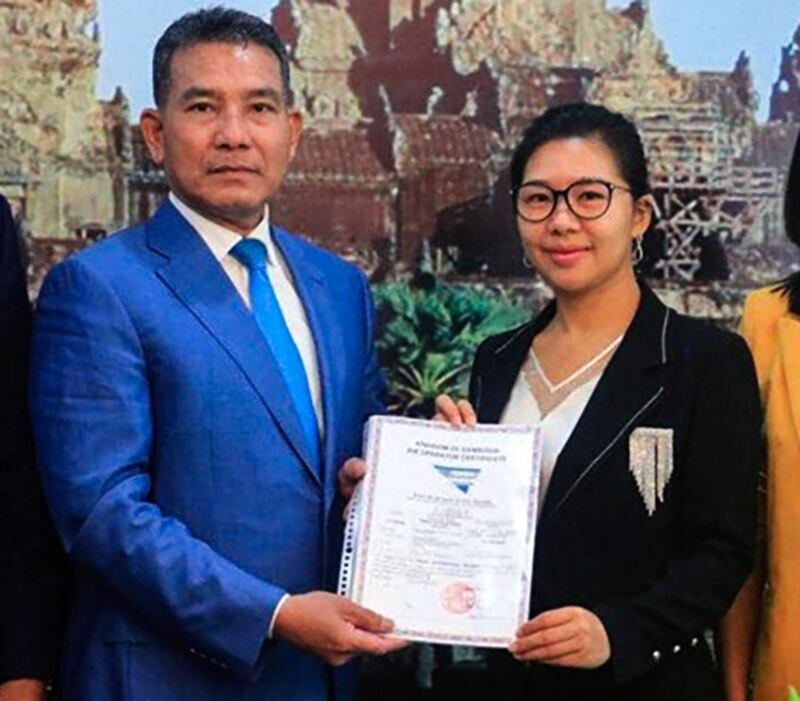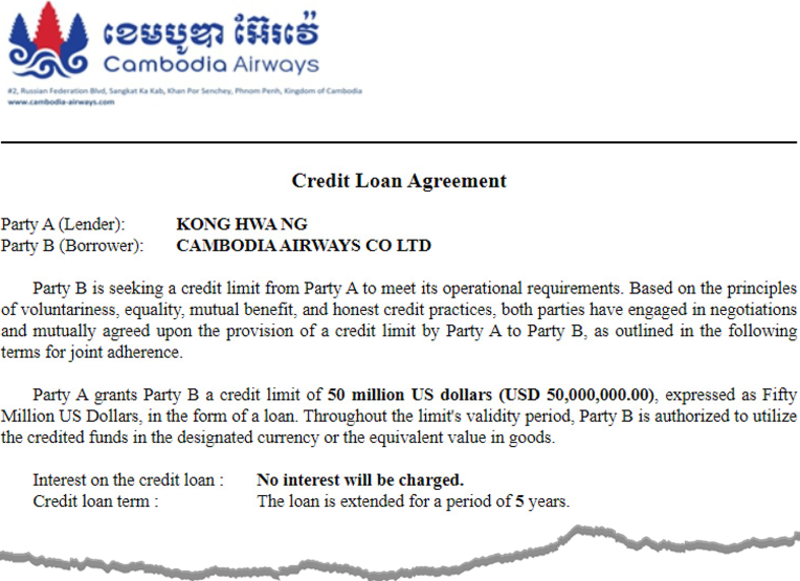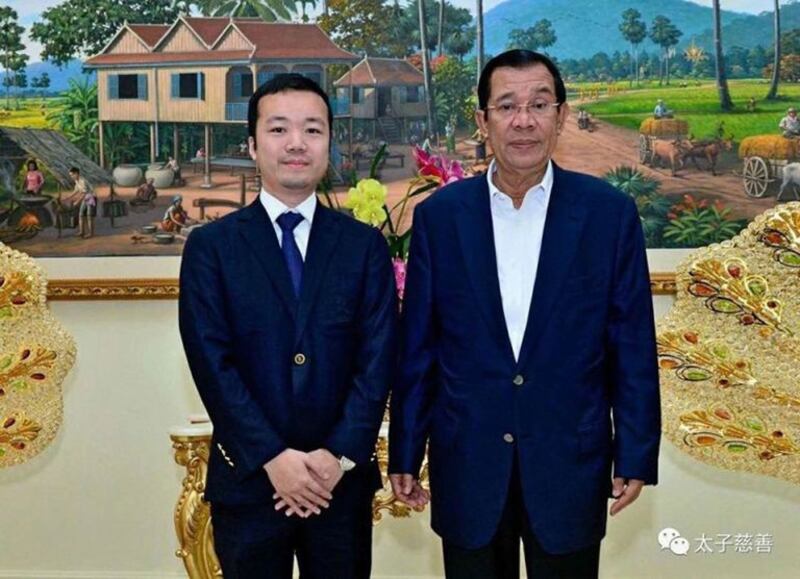An airline that has become the first Cambodian company to attempt to list itself on a U.S. stock exchange has substantial ties to a notorious business conglomerate dogged by allegations of criminality, RFA can reveal.
Cambodia Airways, a Phnom Penh-based passenger airline founded in 2017, made its application for an initial public offering, or IPO, on the Nasdaq stock exchange in May. But its lengthy prospectus never makes mention of its relationship to the Prince Group, an expansive company RFA has previously shown to be linked to criminal investigations, questionable financial practices and forced labor.
The airline, which regularly flies between 16 destinations from Chengdu, China to Kuala Lumpur, Malaysia, was established as a subsidiary of Prince International Airlines, another airline that is also part of the Prince Group.
As recently as November 2022, Prince’s Chief Communications Officer Gabriel Tan described Cambodia Airways as “a member of Prince Holding Group.” (The website for Prince’s charitable foundation still lists the airline as a subsidiary, although it is conspicuously absent from the website of the group’s commercial arm.)
An RFA investigation earlier this year revealed that Prince was the focus of a Chinese police taskforce examining alleged illegal online casinos and money laundering. A compound allegedly hosting enslaved workers near Cambodia’s border with Vietnam was also tied to Prince. Subsequent reporting linked the group to Chinese overseas intelligence operations. Prince Group has repeatedly denied all the allegations.
By omitting its connection to Prince, Cambodia Airways’s disclosures to the Securities and Exchange Commission, or SEC, the U.S. financial regulator, shine a light on an unusual facet of the wider Prince Group.
Most conglomerates have at the top of their hierarchy a holding company, which in turn owns their subsidiary operations. Not so with Prince.
Instead, clusters of companies within the Prince Group are owned – on paper, at least – by individuals with extensive ties to the group, for which they appear to be acting as undeclared proxies. Former Prince insiders say this has allowed the group to acknowledge or disavow member companies as convenience dictates, a practice RFA previously uncovered.

In the case of Cambodia Airways, even a small scratch to its surface reveals layers of connection to the powerful, embattled Prince Group.
Indeed, from its structure to its operations to its political connections, the company replicates patterns used by the larger Prince Group conglomerate to do business, often in questionable ways.
Such details are not scrutinized in standard reviews for companies listings on U.S. markets, leaving room for regulators to approve a firm with links to one of the region’s most controversial business groups – and unwitting members of the public potentially holding shares in an investment tied to what a Chinese court called a “notorious transnational online criminal group."
An unlikely owner
As a multibillion-dollar conglomerate, the Prince Group is not unusual in having subsidiaries.
However, the way in which its many composite companies are set up is highly unusual and, financial experts have told RFA, financially suspect.
Former Prince Group insiders have told RFA that the organization utilizes an ownership structure in which subsidiaries’ shares are not directly held by the group.
Instead, executives for these subsidiaries act as proxy owners on Prince’s behalf. This enables the group to distance itself from problematic ventures – as it has in response to RFA’s prior reporting. It also allows it to shield potentially successful ventures – such as Cambodia Airways – from parts of its reputation that are troubling.

The ownership structure of Cambodia Airways would seem to bear the hallmarks of this kind of set up.
As described in the SEC filings, the $200 million Cambodia Airways is majority owned by a 43-year-old Singaporean national named Kong Hwa Ng through a Cayman Islands company of the same name established for the purpose of listing the airline on the Nasdaq.
Kong spent the first 12 years of his career in his homeland’s armed forces, reaching the rank of sergeant major prior to his discharge in 2014. The following year he moved to Phnom Penh to work as a regional manager for a construction company whose chairman at the time, Chen Bo, is today a director of at least 10 firms within Prince Group. In 2017, Chenbecame the founding chairman of Cambodia Airways and Kong joined the following year, becoming the airline’s vice president. (Chen could not be reached for comment.)
Today, the Chen-founded construction firm which employed Kong has a list of projects on its website. Among them is the Phnom Penh headquarters of Cambodia Airways. A digital mockup of the building has the words “Prince International Airlines” emblazoned over one side, suggesting not only that the two airlines are deeply linked – so much so as to share the same headquarters – but that their newest owner, Kong, has ties to both going back almost a decade.
Because the Cambodian corporate registry doesn’t publish shareholder data it is unclear from public records when exactly Kong became owner of Cambodia Airways.
He was the founder of the Cayman Islands company named Cambodia Airways that in January 2024 took control of the shares of the airline, according to the airline’s prospectus. A month prior, in December 2023, Cambodian corporate records show Chen had stepped down as chairman of the airline in Cambodia to be replaced by Jiang Yifei, who was described as chairwoman of Prince International Airlines in a 2020 Cambodian government press release, and who remains in that position today.
Among Cambodia Airways’s submissions to the SEC is a copy of a March 2021 agreement between the airline and Kong, then its vice president. In it, Kong loaned the company $50 million interest free for five years. The company’s prospectus explains that the loan was arranged to help Cambodia Airways ride out disruptions to the aviation industry resulting from the Covid-19 pandemic.

An employee granting their employer an interest-free loan “just doesn’t make any sort of sense,” financial crime expert Graham Barrow told RFA. “Why not make an equity investment in the company – and therefore access the profits that the $50 million was presumably designed to generate?”
Kong’s background, said Barrow, gives no indication he would have tens of millions of dollars readily accessible to be tied up for five years in a transaction designed to return zero profit to him.
“If Kong Hwa Ng was simply an employee of Cambodian Airways, where did he get the $50 million from?” Barrow asked.
Leaked banking records, first reported on by RFA, previously revealed that the Prince Group routinely uses trusts to allow one person to be listed on public records related to a company that is secretly controlled by someone else.
The source of the money Kong lent, interest-free, to his employer is unclear, but one possibility is that it was not his to begin with, Barrow said.
Repeated emails to Cambodia Airways chairwoman Jiang Yifei seeking comment went unanswered. Contact information for Kong was not available.
Blurred lines
Like other Prince Group entities, Cambodia Airways appears to cultivate close relationships with senior government officials and their associates as part of its standard operating procedures. The methods used to nurture these ties range from the blunt – dealing officials into group companies – to more unconventional, under the table favors.
One such example is a rescue mission that was flown into Melbourne, Australia in 2020 – just two days after the city went into lockdown amid the Covid-19 pandemic. A plane captained by a Cambodia Airways pilot picked up Hun Panhaboth, grandson to Cambodia’s then-prime minister Hun Sen, who had been stranded there with his girlfriend, according to a copy of the flight manifest posted to Instagram by Hun Panhaboth.

The plane was a Gulfstream private jet in Prince International Airlines’s livery — but owned, according to corporate records reviewed by RFA, by a Hong Kong registered firm, Cloud Nine No.6 Leasing Company Limited, a part of a constellation of 10 similarly named firms founded by a longtime business associate of Chen Zhi, the head of Prince Group.
Cloud Nine No.6’s sister companies are identified in Cambodia Airways’s SEC filings as having sold the airline three planes between 2019 and 2021 for a total of $134 million.
Beyond this, Cambodia Airways’s corporate hierarchy appears to employ government ties that could provide it cover and business opportunities.
Puth Thyda is one of three executives proposed by the airline to act as independent directors of the company following its listing on the Nasdaq exchange. According to her biography in Cambodia Airways’s prospectus, she is on the central committee of the Union of Youth Federations of Cambodia, a youth wing of the ruling Cambodian People’s Party that is headed by Prime Minister Hun Manet’s brother, Hun Many.
She is also president of Boeung Ket Football Club, the honorary president of which is Deputy Prime Minister Say Samal, whose wife, Dith Nita, is on the team’s governing board.
In March, senior executives from Cambodia Airways flew to Cuba to discuss potential direct flights between Phnom Penh and Havana. A former employee in a managerial role – who is not being named for safety reasons – told RFA that the airline had hoped to initiate monthly cargo flights between the two cities transporting cigars, but that no suitable aircraft were available. A 2022 report by RFA revealed that Prince Group chairman Chen Zhi is part of a secretive consortium that in late 2020 bought a 50% share in Cuba’s state tobacco exporter for $1.4 billion.
A questionable investment
That the airline only expects to raise a maximum of $7 million from its IPO has raised some eyebrows. “If you’re strapped for cash, one of the hardest ways of raising it would be a U.S. listing,” as one regional investment professional who RFA is not naming for security reasons put it. The costs are just too great. Cambodia Airways’s latest accounts, as shared in the SEC filings, show the airline has already spent some $1.5 million on expenses associated with the listing attempt.
Whether it will ever raise any money remains to be seen. Cambodia Airways has filed three registration statements with the SEC in as many months, each of them cautioning that its shares are not yet for sale. A spokesperson for the SEC said they could not comment on individual companies, while representatives of the Nasdaq stock exchange where the airline is seeking a listing did not respond to RFA’s enquiries on the progress of Cambodia Airways’s listing.
RFA asked Cambodia Airways why it chose not to disclose its deep ties to Prince, but received no response. The same question put to Prince also went unanswered.
Companies whose shares are publicly traded have a legal obligation to be transparent with their investors, including by disclosing information on who is really in charge at the company, and whether there is information that, if made public, could damage the company’s reputation or profits. The consequences of failing to meet these transparency requirements can range from civil lawsuits to criminal charges.
In fact, the underwriter for Cambodia Airways’s IPO bid, Univest Securities, is currently a defendant in U.S. and Cayman Islands lawsuits on just these issues.
Investors allege that Univest and Baosheng, a Chinese media company it underwrote in 2021, failed to disclose in their prospectus that it was the subject of a Chinese police investigation regarding ties to illegal online gambling, according to U.S. and Cayman Islands court filings.
According to court documents, they allege that a “shadow CEO” was secretly running Baosheng, despite not appearing on any paperwork associated with the company. Lawyers for the investors claim that taken together these omissions constitute securities fraud, that their clients were induced to make an investment based on inaccurate information.
Baosheng and Univest have both denied any wrongdoing in court filings, and the courts have yet to rule on the cases. But they highlight just how seriously these matters are taken. Investors have a right to understand the extensive ties Cambodia Airways has to Prince Group, and whether the conglomerate still has a say in how the airline is run. That Prince Group has been the subject of a Chinese police investigation into criminal activity is also relevant.
In Phnom Penh, meanwhile, news of Cambodia Airways’s share offering has enjoyed a mixed reception. Shortly after the share offer was announced, Cambodia Securities Exchange director Kim Sophanita told local news website Kiripost she was “slightly disappointed” that the airline had not even enquired about the possibility of listing its shares on Cambodia’s fledgling stock market, or CSX.
She may find that CSX has dodged a bullet. Cambodia Airways shares are not even available for purchase yet and analysts are already advising investors to steer clear. Donovan Jones, a researcher from investment news portal Seeking Alpha, emphasized the airline’s “operating risks, poor financial results recently and excessive valuation expectations” in cautioning against it as an investment.
Edited by Boer Deng and Abby Seiff.
